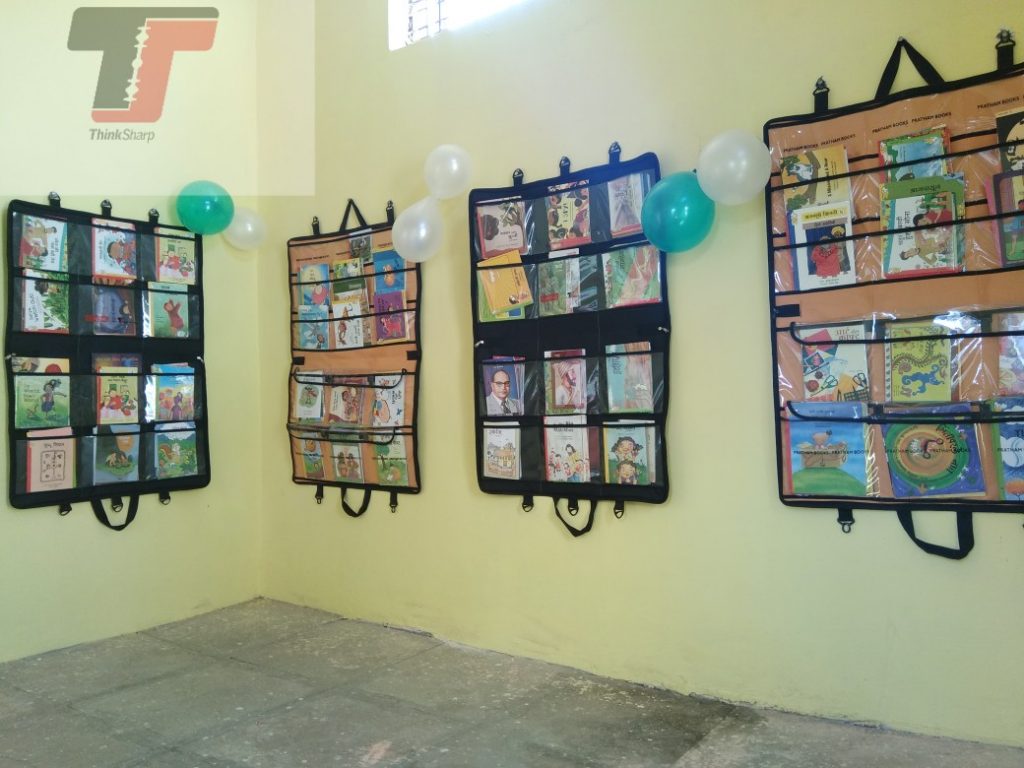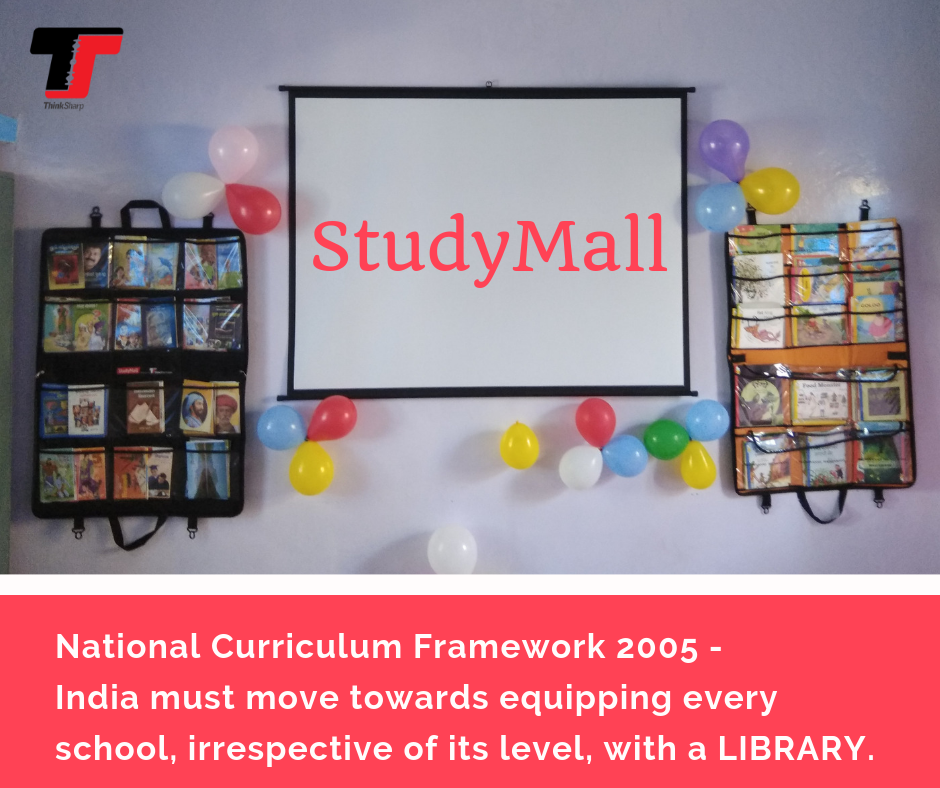Library
While the whole world is advancing and transitioning to digital, most of the rural India is still struggling to have schools and libraries.
School Library: The Focal point
What is a Library? A Library is a building or room containing collections of books, periodicals, and sometimes films and recorded music for use or borrowing by the public or the members of an institution.
In addition to providing materials, libraries also provide the services of librarians who are experts at finding and organizing information and at interpreting information needs.
Libraries often provide quiet areas for studying, and they also often offer common areas to facilitate group study and collaboration. Libraries often provide public facilities for access to their electronic resources and the Internet.
Modern Library – beyond books:
Modern libraries are increasingly being redefined as places to get unrestricted access to information in many formats and from many sources. They are extending services beyond the physical walls of a building, by providing material accessible by electronic means.
Libraries are increasingly becoming community hubs where programs are delivered and people engage in lifelong learning. As community centers, libraries are also becoming increasingly important in helping communities mobilize and organize for their rights.
Library policy is ruled by Raja Rammohun Roy Library Foundation – RRRLF:
RRRLF is a central autonomous organization established and fully financed by the Ministry of Culture, Government of India. RRRLF is registered under the West Bengal Societies Registration Act, 1961. It is the nodal agency of the Government of India to support public library services and systems and promote public library movement in the country commensurate with the objectives as embodied in its Memorandum of Association.
The supreme policy-making body of RRRLF is called the Foundation. It consists of 22 members nominated by the Government of India from amongst eminent educationists, librarians, administrators and senior officials. The Minister of the Department of Culture, Government of India or his nominee is the Chairman of RRRLF. Professor Brij Kishore Sharma is the present Chairman of RRRLF and Director General is the executive head and ex-officio Member-Secretary of the Foundation.
The Foundation works in close association and active cooperation with different State Govts. and Union Territory Administrations through a machinery called State Library Planning Committee (SLPC/SLC) set up in each State at the instance of the Foundation. To participate in Foundation’s programs, a State Government/U.T. is required to contribute a certain amount fixed by the Foundation.
Since 2005-06 the Foundation has also taken up the initiative to develop the District Youth Resource Centre (DYRC) in collaboration with Nehru Yuvak Kendra Sangathana, an autonomous organization under the Ministry of Sports & Youth Affairs.
School Library Policy says:
- One period a week to be devoted to library reading.
- During this time, children sit and read silently in the library. They return the books borrowed the previous week and borrow new ones.
- If there is no library room, the teacher can bring out books appropriate to the age group and allow children to choose from the set.
It is important to let the child choose rather than having the teacher distribute the books.
- Library books can be brought into the language class.
- For class projects, children can be asked to look up a reference in the library.
- Children can be asked to write about the book they have read that week during the language class.
- Children can be asked to share a story they have read with the other children in class.
- The school library should be kept open during vacations.
Current status of availability of School Libraries
People who are worried about their basic needs of food, clothing and shelter can’t imagine remotely using school or public libraries. Commercialization of education has now added a new dimension to the existing problems of school education.
School libraries in India, wherever they exist, face a multitude of problems ranging from inadequate space for keeping books and reading space in school buildings to less trained staff.
Non availability of regular funds for acquiring reading materials is a major problem faced by school libraries in government and semi-government sector.
These schools have only amalgamated funds and parent-teacher association fund from which only a limited number of approved books can be purchased.
Schools in the private sector do not have much of a problem with funds but availability to library is subject to priority given to it by Head of School.
The collections have not grown beyond the prescribed books in the syllabus with a few exceptions.
Even the books approved by state directorates of education neither are of good quality nor directly relevant.
The ad-hoc system of school libraries is running throughout the length and breadth of the country in the absence of any specific guidelines and standards for their sustained growth.
Rural schools are lagging behind the urban ones in terms of professionally trained library staff.
There are no incentives for trained staff for working in rural schools, besides the problems mentioned earlier are manifested to a greater degree.
While there is need for training of professional librarians, mechanisms have not been developed and avenues are not available for this.
Importance of School Library
In many parts of the country, community libraries are functioning in rural areas, and government libraries exist in many district headquarters.
However, commute to these common libraries by children is challenging.
Hence, in order to maximize the use of resources, it is important to plan a library in each school.
Library enables a child to attain great wisdom at almost free of cost.
Library and book reading not only improves reading habits but also a child’s imagination.
Children can learn about:
- Different countries, people, traditions, languages, flora, fauna
- Various scientists, freedom fighters, world wars,
- Planets, the vast space, aero science etc.
And the list goes on thus strengthening the young India, capable to transform the world to a new era.
This will also increase the nation’s literacy rate by heaps and bounds.
So powerful the books are!
Despite this fact, why is it still a challenge to instill reading as a hobby?
Possible reasons children not keen in reading books
- Unable to focus reading for long time
- Unaware of the kind of books to read
- Unable to find out own interests to choose a book
- Lack of guidance from parents and teacher
Tips to encourage children visiting libraries and reading books
Initially, children need guidance on book reading. Children learn what they watch most of the time!!
Book reading should either be a hobby of parents or best friends so that a child can watch and learn.
In this busy life, it is rare to notice book reading as a hobby of parents. And that too in rural India, it is almost impossible!
Teachers and librarians play a major role in encouraging book reading.
While the Policy has already mentioned most of the tips, below are few more:
- Allow children to read a book and conduct activities like:
- Debates,
- Group discussion
- Essay writing
- Role plays
- Skits
These will not only improve child’s reading ability but also their personality and confidence.
- Let children participate in various inter-school competitions
- While conducting awareness programs on “book reading”, it will be a good idea to involve children.
Children’s speech has more impact as they stand true examples!!
Besides academics, library should provide access to:
- Newspapers – English and local language
- Moral story books
- Poetry, literature
- Personality development books like You Can Win!
- English grammar books like Wren & Martin
- Dictionaries – English to local language translation
- Aptitude and mathematics books for Competitive examinations like Ramanuja Test and CV Raman Tests (for Secondary schools)
- State, India and World maps
- Depending on the students’ interest, books on gardening, farming etc can also be added so that students will be aware of backyard farming.
Various NGOs work closely on Child Education and School Libraries. Few of them are:
- Akshara
The organization was founded on the belief that quality education is the undeniable right of every child and that children should not be deprived of this just because they do not have access to it or the resources to realise their dreams. — https://akshara.org.in/
- Pratham Books
Pratham Books is a nonprofit publisher introducing children to the joy of reading. — https://prathambooks.org
- Room to read
Room to Read seeks to transform the lives of millions of children in low-income communities by focusing on literacy and gender equality in education. Working in collaboration with local communities, partner organizations and governments, we develop literacy skills and a habit of reading among primary school children, and support girls to complete secondary school with the relevant life skills to succeed in school and beyond. — https://www.roomtoread.org/countries/india/
- Last but not the least; ThinkSharp Foundation has also extended its hand in promoting education in rural India.
ThinkSharp Foundation is a non-profit organization established in 2011 with a vision
“To bridge the Rural-Urban education divide”.
Overcoming the space issues, ThinkSharp foundation has come up a project of “StudyMall” with a new idea of “Modular Hanging Library” .

StudyMall offers
- Digital Class with modern digital learning tools such as window/android projector, computers, multimedia content and power backup through UPS or solar.
- Library with poem, story, environment, science and general knowledge books.
- Colorful, safe and clean Classrooms
- Workshops and trainings on digital literacy and educational guidance.
StudyMall is nothing but a “Modern Library” which is way beyond just books.
Such a lively environment makes children feel to visit the library often and spend more time reading books or involving in many activities.
More details on StudyMall can be found at http://www.thinksharpfoundation.org
Conclusion
Agree that the current era is marked in the name of “Digital” and everything is revolving around internet.
While moving towards Digital, books and library should be given equal importance.
Paying a visit to nearby Library and inculcating reading habits in children are few of the major responsibilities of parent and teachers.
Let us join our hands and together mold our own country.
Written By
Malathi Krishna P
malathi123in@gmail.com
(216)

